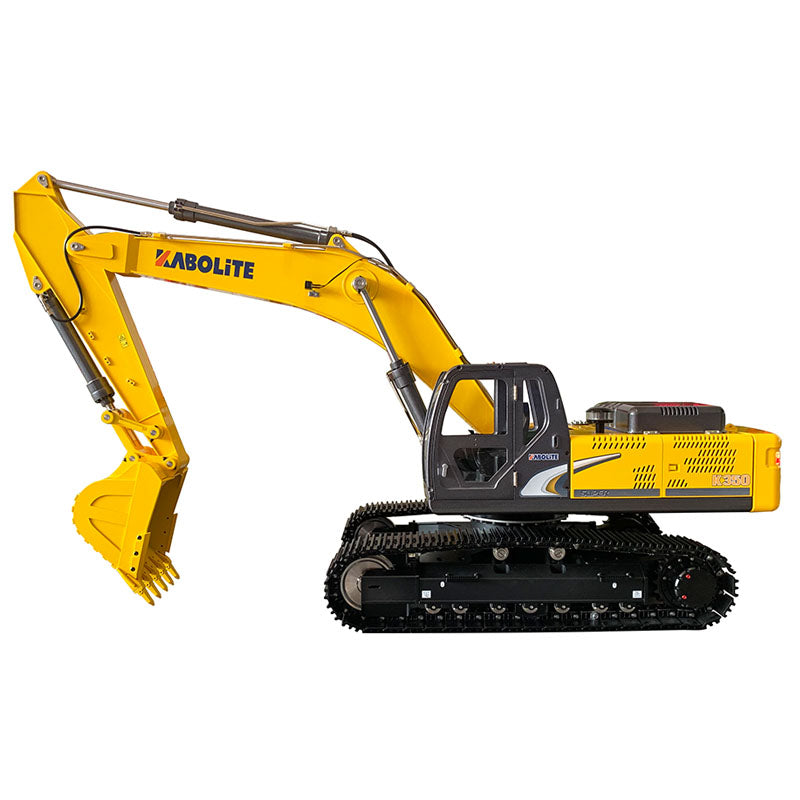Understanding Just How Excavator Functions and Its Influence On Performance
Excavators play a crucial duty in construction and mining procedures, relying upon a complex interplay of mechanical and hydraulic systems. Their capacity to do a variety of jobs hinges on both their style and the innovation integrated within. Recognizing these parts can considerably impact operational effectiveness and performance. As improvements proceed to improve the market, one have to take into consideration just how these adjustments will influence future techniques and performance.
The Fundamentals of Excavator Mechanics

The Function of Hydraulic Equipments in Excavators
At the heart of excavator procedure lies the hydraulic system, which plays a crucial function in powering the maker's motions and functions. This system utilizes pressurized hydraulic liquid to transfer energy, making it possible for various actions such as training, digging, and moving. By taking advantage of the concepts of hydraulics, excavators can do tasks with amazing accuracy and pressure, enhancing general functional efficiency.The hydraulic system contains crucial components, consisting of pumps, shutoffs, and cyndrical tubes, which interact to regulate the flow and direction of the fluid. When the driver involves the controls, the hydraulic fluid is directed to particular cylinders, equating the operator's commands right into physical activity. This device allows for receptive and smooth activities, which are vital in construction and excavation atmospheres. double e volvo rc excavator. The performance of the hydraulic system directly influences the productivity and convenience of the excavator, making it an important element in modern excavation processes
Trick Elements of an Excavator
Recognizing the essential parts of an excavator is vital for understanding how this effective machine runs. An excavator includes a number of substantial aspects, consisting of the undercarriage, residence, bucket, boom, and arm. The undercarriage gives security and mobility, commonly including tracks or wheels to browse various surfaces. Your house has the engine and hydraulic systems, enabling the driver to manage movement and power the maker. The boom expands from your home, making it possible for vertical reach, while the arm attaches to the container, helping with digging and lifting operations.Additionally, the cab houses the driver, outfitted with controls for specific maneuvering. Each of these components plays an essential role in the excavator's total capability, contributing to its efficiency and effectiveness on building and construction websites. Comprehending these parts aids in enhancing and keeping excavator efficiency, making sure tasks are completed securely and properly.
Attachment Versatility and Its Advantages
Attachment versatility is a crucial aspect of excavators, enabling drivers to switch between various tools tailored for specific tasks. This adaptability not just improves work efficiency however also adds to cost-effectiveness by lowering the demand for multiple devices. Comprehending the different sorts of accessories readily available can considerably impact the total performance and performance of an excavator on work websites.
Sorts of Accessories
While excavators are largely acknowledged for their digging capacities, their true convenience depends on the large range of attachments available. These add-ons improve the excavator's performance, allowing it to carry out different jobs past excavation. Common attachments include buckets (for digging and scooping), hydraulic thumbs (for realizing products), and augers (for drilling openings) Grapples are made use of for relocating and handling particles, while rippers can separate difficult surfaces. Various other specialized add-ons, such as trenchers and rakes, enable excavators to adjust to certain job demands. This variety not only enhances the machine's utility throughout various industries, including demolition, building and construction, and landscaping, yet also enables operators to customize their equipment to fulfill particular project demands effectively.
Boosted Work Performance
Making the most of work efficiency is a main advantage of using different excavator attachments. Different attachments permit an excavator to do several tasks without requiring to switch over devices, saving useful time and labor. For example, utilizing a hydraulic hammer can break concrete while a pail attachment can dig deep into dirt, enabling a seamless operations. This flexibility decreases downtime connected with equipment changes and improves productivity on-site. In addition, specialized accessories boost accuracy in tasks such as grading or landscape design, leading to better outcomes. The capability to adjust to various task requirements not only enhances operations however likewise lessens This Site the need for added machinery, guaranteeing that jobs are completed swiftly and efficiently. Generally, accessory convenience substantially adds to boosted job effectiveness in excavation work.
Cost-Effectiveness and Adaptability
Cost-effectiveness is a considerable benefit of utilizing flexible excavator add-ons. These attachments enable a single excavator to do several tasks, decreasing the need for extra equipment and labor - double e volvo rc excavator. By changing in between buckets, hammers, and grapples, operators can tackle different projects, from excavating to demolition, thereby making best use of tools application. This flexibility not only lowers functional costs yet also reduces downtime connected with altering tools. Additionally, the capability to personalize excavators with specialized add-ons boosts performance, as they can successfully deal with diverse jobs according to job demands. To wrap up, the combination of cost-effectiveness and flexibility in excavator accessories contributes to boosted operational effectiveness and resource appropriation in building and excavation tasks

Advanced Modern Technology in Modern Excavators
Modern excavators are increasingly equipped with advanced technology that transforms excavation processes. Automation streamlines procedures, while boosted gas performance decreases operational prices. Additionally, smart control systems boost accuracy and safety and security, noting a substantial evolution in excavation equipment.
Automation in Excavation Processes
As excavation technology develops, automation has become a crucial element in improving effectiveness and accuracy on work sites. Modern excavators are outfitted with innovative automated systems that assist in tasks such as grading, excavating, and trenching with marginal operator intervention. These systems use sensors, GPS, and artificial intelligence algorithms to ensure exact positioning and deepness control, significantly lowering the margin for error. In addition, automation allows drivers to concentrate on calculated decision-making instead of hands-on controls, resulting in improved efficiency overall. Such developments not just streamline operations however likewise improve safety and security by reducing human error in complex procedures. The assimilation of automation in excavation procedures represents a significant improvement in building technology, driving the market in the direction of better performance and effectiveness.
Boosted Gas Efficiency
Developments in technology have actually additionally led to significant enhancements in gas performance for modern excavators. Modern equipments are furnished with advanced engines that optimize power outcome while decreasing fuel usage. These engines use cutting-edge combustion innovations, such as turbocharging and direct gas shot, to boost efficiency and performance. Additionally, light-weight materials in building minimize general weight, permitting much less energy expenditure throughout procedure. The intro of variable rate controls enables drivers to readjust engine efficiency according to details jobs, further lessening gas use. As an outcome, these enhancements not only lower functional costs however additionally add to ecological sustainability by lowering exhausts. Generally, enhanced fuel performance in excavators is a vital development that reinforces productivity and economic stability in the building and construction sector.
Smart Control Systems
While drivers navigate progressively intricate job websites, clever control systems in excavators have become necessary devices for enhancing performance and accuracy. These sophisticated innovations make use of formulas and sensors to keep track of different criteria such as load weight, surface conditions, and functional performance. By immediately readjusting hydraulic functions, smart systems optimize equipment performance, resulting in improved efficiency and lowered wear on elements. Furthermore, operators gain from instinctive interfaces that give real-time feedback and diagnostics, enabling for notified decision-making. This combination of modern technology not only enhances operations however also minimizes human error, adding to much safer job environments. As the building and construction industry remains to evolve, clever control systems will play a vital duty in forming the future of excavator effectiveness and effectiveness.
Enhancing Operational Effectiveness With Excavators
Excavators play a vital role in improving operational performance across numerous building and excavation projects. Their flexibility enables multiple tasks, including material, training, and digging handling, which improves operations and discover here decreases the need for extra devices. With powerful hydraulic systems, excavators can carry out durable tasks with precision, significantly decreasing the moment needed to total tasks. The assimilation of innovative modern technology, such as GPS and automated controls, better optimizes their procedure, allowing operators to achieve higher accuracy and reduce material waste. In addition, modern-day excavators are made to take in much less gas and decrease discharges, adding to both cost financial savings and environmental sustainability. By using excavators properly, construction teams can enhance performance, satisfy project target dates, and enhance general site administration. This multifunctionality and efficiency make excavators essential tools in the modern-day building landscape.
The Future of Excavators in Building and Mining Industries
As the building and construction and mining industries progress, the future of excavators is poised for considerable improvement driven by technological development and transforming operational needs. Developments in automation and fabricated intelligence are improving excavator capacities, allowing for boosted precision and effectiveness in procedures. Autonomous excavators are emerging, decreasing the demand for human intervention and decreasing the danger of accidents.Moreover, the integration of telematics and IoT modern technology allows real-time monitoring of device efficiency and anticipating upkeep, enhancing uptime. Eco-friendly designs, including electrical and hybrid designs, are obtaining traction, lining up with sustainability goals within the industry.Additionally, using advanced materials and lighter layouts improves fuel performance while maintaining performance criteria. As these fads development, excavators will play an important role in meeting the boosting needs for productivity and safety in building and mining, eventually changing operational landscapes.
Regularly Asked Questions
How Do Climate Condition Influence Excavator Efficiency?

Climate condition significantly influence excavator efficiency, as rainfall and mud can prevent grip and stability, while extreme temperatures may impact hydraulic systems. Operators should adjust to these variables to ensure ideal performance and safety and security throughout operations.
What Precaution Should Operators Follow While Making Use Of Excavators?
Precaution for excavator operators include using proper individual safety equipment, conducting pre-operation examinations, making sure proper communication with ground personnel, preserving a secure range from overhead risks, and adhering to well-known functional protocols to avoid crashes.
How Frequently Should Excavators Be Kept for Ideal Efficiency?
Excavators should be preserved on a regular basis to guarantee peak efficiency, commonly every 250 operating hours or as defined by the manufacturer. Routine checks boost dependability, protect against unforeseen failures, and prolong the life-span of the tools.
What Is the Average Lifespan of an Excavator?
The ordinary life expectancy of an excavator normally varies from 10,000 to 15,000 hours of procedure. Elements influencing long life include upkeep practices, running conditions, and the top quality of the device itself, affecting overall efficiency and performance.

Can Excavators Operate Irregular Surface Successfully?
Excavators can run efficiently on irregular surface because of their expressed designs and adjustable tracks. These features permit them to maintain security and grip, enabling effective procedure in challenging atmospheres commonly come across in building and view it landscaping tasks. Each of these parts plays a vital role in the excavator's total performance, contributing to its performance and performance on building websites. Maximizing work performance is a key advantage of making use of numerous excavator accessories. While drivers navigate progressively complex work sites, clever control systems in excavators have arised as crucial tools for improving efficiency and accuracy. Excavators play a necessary function in improving operational efficiency throughout different building and excavation projects. Developments in automation and fabricated intelligence are improving excavator abilities, permitting for enhanced accuracy and performance in procedures.